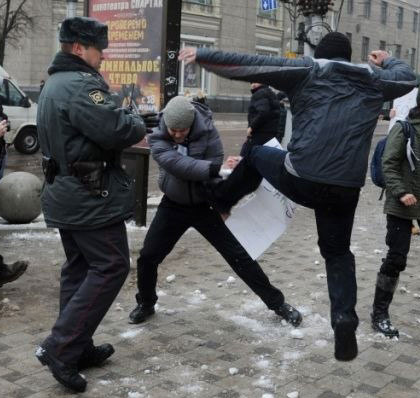Appeal to Russia: Drop anti-gay bill that spurs anti-gay violence
Colin Stewart is a 45-year journalism veteran. He is the…
Human Rights Watch issued this press release today, arguing that the anti-gay violence confronting recent protests against a Russian proposal for a national ban on “gay propaganda” shows that such a law would encourage further violence against lesbian, gay, bisexual, and transgender people:

MOSCOW –Vicious attacks on gay rights protesters in Russia in recent days underscores the need for the Russian Duma to reject a draft law on “propaganda for homosexuality.” Russian authorities should thoroughly investigate the violence and new threats and hold accountable those responsible.
On January 25, 2013, the Duma, the lower chamber of parliament, voted in the first reading in favor of draft provisions that would impose fines on individuals, government officials, and organizations that engage in “promoting” homosexuality to anyone under 18.
“The draft law contributes to an atmosphere that makes violence against LGBT protesters seem acceptable,” said Anna Kirey, a researcher with the lesbian, gay, bisexual, and transgender (LGBT) program at Human Rights Watch. “If adopted, the bill would violate the free expression rights of all Russians and discriminate against and further stigmatize Russia’s LGBT community.”
The bill led to protests before the Duma debate by LGBT rights supporters in at least six Russian cities and internationally. Assailants attacked protesters in several Russian cities, with the most severe attack in Voronezh, about 400 kilometers south of Moscow. Several nationalist groups published specific and explicit calls to attack LGBT activists protesting the bill.
On January 20, six activists protesting in Voronezh were attacked by a large mob. Alexei Kozlov, a prominent local activist who witnessed the violence, told Human Rights Watch that before the demonstration could even start, about 200 counter-protesters, some of them masked, gathered in concentric circles at the rally site to block the protest.
With the rally site blocked, the LGBT protesters gathered about 100 meters away. Kozlov told Human Rights Watch that the counter-protesters threw snowballs, plastic bottles filled with liquid, and cans of paint at the LGBT protesters, and shouted “Beat the faggots!”
Assailants threw Andrey Nasonov, one of the protest organizers, to the ground and kicked him until he lost consciousness, Kozlov said. They also attacked another young man, cutting his head, and several women, throwing one of them to the ground and kicking her.
Nasonov, 22, was hospitalized with a concussion and discharged that evening.
Law enforcement officers and municipal officials at the scene did not intervene to stop the assault on the LGBT protesters, Kozlov said.
According to various sources, the authorities detained between three and six people after the violence, all of whom were released the same day. The Investigation Committee, the state agency in charge of criminal investigations,opened a preliminary inquiry into the threats, violence, and interference with a public assembly, and the police inaction. The police department said that it opened a misdemeanor case against counter-protesters for violating the procedure for organizing public assemblies.
One of the protest organizers told Human Rights Watch that after putting an announcement about the demonstration on social media, the organizers started receiving death threats through social media platforms, with the authors stating specifically they would violently disrupt the rally. One of the threats read: “Blasphemous scum, we’ll come to kill you on Sunday!”
Three days before the protest, on January 17, the organizers filed a criminal complaint about the threats with the Investigation Committee and a statement with the police and the local authorities, calling on them to prevent violence at the protest.
“Opening an inquiry is a good step, but it’s only a beginning,” Kirey said. “There needs to be a thorough investigation and the authorities need to hold responsible the people who carried out the threats and violence.”
Instead of adopting a bill banning “homosexual propaganda” Duma members should publicly condemn homophobic violence, Human Rights Watch said.
Only one member of Russian parliament voted against the bill and one abstained, with 388 members voting for the bill. The Duma called for a working group to refine the definitions of “propaganda” and “homosexuality.”
The Duma postponed further discussion of the bill until May. If approved after three readings and signed by the president, it would become law.
The bill would amend Russia’s Code of Administrative Law Violations. Under the amendments, individuals found responsible for “propaganda for homosexuality among minors” would face fines of up to 5,000 rubles (US$160), and organizations would face fines of up to 500,000 rubles (US$16,000). Similar laws banning “homosexual propaganda” have been adopted in 10 Russian regions and are pending in another six. Russian activists report an increase in violence against LGBT people since these bills were introduced.
In its explanatory memorandum that accompanied the draft federal law, its sponsors justified the amendments as necessary “to ensure the intellectual, moral and mental protection of children.” However, the European Court of Human Rights has repeatedly affirmed that the desire to “protect” children from information about homosexuality is not justified by the principle of best interests of the child, and has found such measures to be discriminatory.
The United Nations Committee on the Rights of the Child reiterated in 2003 that the Convention on the Rights of the Child requires “appropriate and timely information which … enables them [children] to deal positively and responsibly with their sexuality in order to protect themselves from HIV infection.” The committee also urged countries to “refrain from censoring, withholding or intentionally misrepresenting health-related information, including sexual education and information.”
Related articles
- Protests: Anti-gay bill violates Russian traditions of love, respect (76crimes.com)
- Vote of 338-1 for Russian ‘gay propaganda’ bill (76crimes.com)
- European plea to Russia: Anti-gay law would harm ‘core values’ (76crimes.com)
- Call for protests against Russian ‘gay propaganda’ bill (76crimes.com)
- Violence greets Russian protests against anti-gay bill (76crimes.com)
- 10th region in Russia adopts ‘gay propaganda’ law (76crimes.com)


